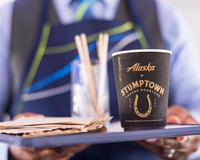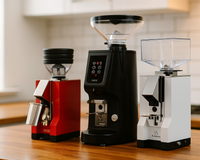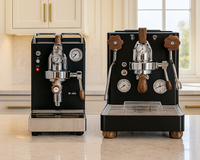The Ultimate Guide to Choosing the Perfect Espresso Machine for Your Coffee Shop
Looking to serve the perfect cup of espresso in your coffee shop? Choosing the right espresso machine is crucial for achieving consistently great results. In this ultimate guide, we will walk you through the key factors to consider when selecting the perfect espresso machine for your coffee shop.
Whether you're a new entrepreneur or a seasoned coffee shop owner, this comprehensive guide will help you make an informed decision. We will explore the different types of espresso machines, such as manual, semi-automatic, and automatic, and discuss the benefits and drawbacks of each.
The guide will also cover important features to look out for, including boiler type, group head configuration, and steam wand design. We'll provide expert advice on choosing the right machine size and capacity based on your specific needs. Furthermore, we'll share tips to ensure ease of maintenance and troubleshooting.
Don't settle for subpar espresso in your coffee shop. With our ultimate guide, you'll have all the knowledge you need to choose the perfect espresso machine that will wow your customers with every sip. Let's dive in and get started!
Why choosing the perfect espresso machine is crucial for a coffee shop
The espresso machine is the heart of any coffee shop. It is the centerpiece of your operation and the key to serving consistently great espresso-based drinks. Choosing the right espresso machine can make a significant difference in the quality of your beverages, customer satisfaction, and the overall success of your coffee shop.
Serving exceptional espresso is not just about the skill of your baristas. It also depends on the capabilities and performance of your espresso machine. The right machine can extract the perfect shot of espresso, with the right balance of crema, aroma, and flavor. On the other hand, an inferior or poorly-matched espresso machine can result in subpar drinks, leading to customer dissatisfaction and potentially damaging your reputation.
Moreover, the efficiency and reliability of your espresso machine can impact the overall productivity and profitability of your coffee shop. A well-designed and durable machine can minimize downtime, reduce maintenance costs, and allow your baristas to work more efficiently, ultimately contributing to the financial success of your business. Investing in the right espresso machine is, therefore, a crucial decision that can have far-reaching implications for your coffee shop's operations and reputation.

Different types of espresso machines
When it comes to espresso machines, there are three main types to consider: manual, semi-automatic, and automatic. Each type has its own unique characteristics, advantages, and drawbacks, and the choice will depend on your specific needs and preferences.
Manual espresso machines, also known as lever machines, require the barista to manually operate the lever to create the necessary pressure for brewing espresso. These machines offer a high level of control and allow baristas to fine-tune the extraction process, resulting in a more personalized and artisanal espresso experience. However, manual machines can be more labor-intensive and require a higher level of skill and training from the barista.
Semi-automatic espresso machines, on the other hand, provide a balance between manual control and automation. These machines have an electric pump that generates the necessary pressure, but the barista still has control over the shot volume and extraction time. Semi-automatic machines are generally more user-friendly and require less training than manual machines, making them a popular choice for many coffee shops.
Automatic espresso machines are the most hands-off option, with the machine taking care of the entire brewing process. These machines are programmed to automatically control the water pressure, temperature, and shot volume, ensuring consistent results with minimal barista intervention. Automatic machines are often preferred in high-volume coffee shops or for owners who want to minimize the skill required from their baristas.
Factors to consider when choosing an espresso machine
When selecting the perfect espresso machine for your coffee shop, there are several key factors to consider. These include:
Boiler type
The boiler is the heart of an espresso machine, responsible for heating the water and generating the necessary pressure for brewing. The two main boiler types are single-boiler and dual-boiler. Single-boiler machines use a single boiler for both brewing and steaming, while dual-boiler machines have separate boilers for each function. Dual-boiler machines generally offer better temperature stability and the ability to brew and steam simultaneously, but they are also more expensive.
Shop our range of dual boiler espresso machines >
Group head configuration
The group head is the interface where the portafilter (the handle that holds the coffee grounds) attaches to the machine. The number and arrangement of group heads can vary, with single-group, dual-group, and even triple-group configurations available. The group head configuration will depend on your expected volume and the number of baristas working at the same time.
Design
The steam wand is used to froth and steam milk for espresso-based drinks like cappuccinos and lattes. The design and functionality of the steam wand can greatly impact the quality of your milk-based beverages. Look for steam wands with adjustable positioning, good range of motion, and efficient steam power for optimal milk frothing.
Programmability and automation
Some espresso machines offer advanced features like programmable shot volumes, pre-infusion, and automatic tamping. These features can help ensure consistent and repeatable results, reducing the skill required from your baristas and improving overall efficiency.
Use and maintenance
Consider the overall user-friendliness of the espresso machine, including the control panel, water tank access, and the ease of cleaning and maintaining the machine. Machines with intuitive interfaces and straightforward maintenance procedures can save time and reduce the workload for your baristas.

Budget considerations for purchasing an espresso machine
Espresso machines can vary greatly in price, ranging from a few hundred dollars for entry-level models to tens of thousands of dollars for high-end, commercial-grade machines. When determining your budget, it's important to consider not just the upfront cost but also the long-term operating and maintenance expenses.
Investing in a quality espresso machine, even if it comes with a higher initial price tag, can pay dividends in the long run. These machines are typically more durable, reliable, and energy-efficient, which can translate to lower maintenance and utility costs over time. Additionally, a well-performing espresso machine can help you attract and retain customers, ultimately contributing to the overall profitability of your coffee shop.
That said, it's also important to be realistic about your budget and the specific needs of your coffee shop. If you're a new or small-scale operation, an entry-level or mid-range espresso machine may be a more appropriate choice, as long as it meets your current and anticipated future demands. As your business grows, you can always upgrade to a more sophisticated model down the line.
When evaluating the cost of an espresso machine, be sure to factor in not only the purchase price but also the cost of any necessary accessories, such as grinders, tampers, and milk pitchers. Additionally, consider the ongoing maintenance and repair costs, as well as the energy consumption of the machine, as these can also have a significant impact on your overall operating expenses.
The importance of machine durability and reliability
Durability and reliability are crucial factors when choosing an espresso machine for your coffee shop. These machines are subjected to heavy use, often operating for long hours every day, and they need to withstand the demands of a busy, fast-paced environment.
A durable and reliable espresso machine can provide several key benefits for your coffee shop:
- Consistent performance: A well-built machine is less likely to experience breakdowns or performance issues, ensuring that you can consistently serve high-quality espresso drinks to your customers.
- Reduced downtime: When an espresso machine fails, it can cause significant disruptions to your operations, leading to lost revenue and dissatisfied customers. A reliable machine minimizes the risk of unexpected breakdowns and the associated downtime.
- Lower maintenance costs: Durable machines typically require less frequent maintenance and repairs, saving you money in the long run. This can be especially important for coffee shops with limited budgets or resources.
- Longer lifespan: A high-quality espresso machine can last for many years, providing a strong return on your initial investment. This can be particularly beneficial for coffee shops that plan to operate for the long term.
When evaluating the durability and reliability of an espresso machine, consider factors such as the materials used in its construction, the quality of the internal components, and the reputation of the manufacturer. It's also a good idea to research the machine's maintenance requirements and seek out reviews from other coffee shop owners who have used the same or similar models.

Understanding the different features and functionalities of espresso machines
Espresso machines come equipped with a wide range of features and functionalities, each of which can have a significant impact on the performance and user experience. Understanding these features can help you make an informed decision when choosing the right machine for your coffee shop.
One key feature to consider is the temperature control system. Precise temperature management is crucial for extracting the perfect espresso shot, as even minor fluctuations can affect the flavor and aroma. Look for machines with advanced temperature control mechanisms, such as thermoblocks or thermocoils, which can maintain stable temperatures throughout the brewing process.
Another important feature is the water pressure system. Espresso machines use high-pressure water to extract the coffee, and the pressure level can greatly influence the quality of the final drink. Machines with adjustable pressure settings or advanced pressure profiling capabilities can give your baristas more control over the extraction process, allowing them to fine-tune the flavor and texture of the espresso.
Espresso machines may also offer features like pre-infusion, which gradually wets the coffee grounds before the full brewing pressure is applied, and automatic tamping, which ensures consistent puck preparation. These features can help improve the consistency and quality of your espresso drinks, even for less experienced baristas.
Additionally, consider the machine's steam wand functionality, as this can impact the quality of your milk-based beverages. Look for steam wands with adjustable positioning, good range of motion, and efficient steam power for optimal milk frothing and texturing.
Understanding these features and how they can benefit your coffee shop's operations will help you make a more informed decision when selecting the perfect espresso machine.
Evaluating the size and capacity of espresso machines
The size and capacity of an espresso machine are crucial considerations when choosing the right one for your coffee shop. The machine's size and output must be well-suited to the specific needs and demands of your business.
When evaluating the size of an espresso machine, consider the available counter space in your coffee shop. Measure the dimensions of the area where you plan to install the machine and ensure that it will fit comfortably without compromising your workflow or customer seating. Compact, single-group machines may be better suited for smaller coffee shops, while larger, multi-group models are typically more appropriate for high-volume operations.
In addition to the physical size of the machine, you'll also need to consider its capacity in terms of output. This includes factors such as the number of group heads, the size of the boiler, and the machine's ability to handle simultaneous brewing and steaming tasks. A machine with a higher capacity can serve more customers in a shorter amount of time, increasing your overall productivity and efficiency.
However, it's important to strike the right balance between capacity and your actual needs. Purchasing a machine that is significantly larger than required can result in wasted energy, increased utility costs, and unnecessary maintenance expenses. Conversely, an underpowered machine may struggle to keep up with peak demand, leading to longer wait times and dissatisfied customers.
When determining the appropriate size and capacity for your coffee shop, consider factors such as your current customer traffic, anticipated future growth, and the number of baristas working at any given time. Consult with the manufacturer or a trusted espresso machine supplier to ensure that you select a model that perfectly matches your specific requirements.

Considering the maintenance and cleaning requirements of espresso machines
Maintaining and cleaning an espresso machine is a critical aspect of owning and operating a coffee shop. These machines are complex pieces of equipment that require regular attention and care to ensure optimal performance and longevity.
When evaluating potential espresso machines, it's important to consider the maintenance and cleaning requirements. Some key factors to keep in mind include:
- Accessibility: Look for machines with easy-to-access components, such as the water tank, steam wand, and group heads. This will make routine cleaning and maintenance tasks more efficient and less time-consuming for your baristas.
- Cleaning and descaling: Espresso machines require regular cleaning and descaling to remove mineral buildup and ensure consistent water flow. Seek out machines with intuitive cleaning cycles and easy-to-use descaling processes.
- Parts replacement: Understand the availability and cost of replacement parts for the machine. Readily available and affordable parts can simplify maintenance and reduce downtime.
- Manufacturer support: Consider the level of support and guidance provided by the machine's manufacturer. Look for companies that offer comprehensive maintenance resources, troubleshooting assistance, and responsive customer service.
- Barista training: Ensure that your baristas receive proper training on the machine's maintenance and cleaning procedures. This will help them identify and address potential issues quickly, reducing the risk of costly repairs or breakdowns.
By carefully considering the maintenance and cleaning requirements of an espresso machine, you can ensure that your investment continues to perform at its best, providing consistent and high-quality espresso drinks for your customers.
Top espresso machine brands and models to consider
When it comes to selecting the perfect espresso machine for your coffee shop, there are several top brands and models worth considering. Here are some of the leading options:
- Breville: Breville is a renowned brand known for its innovative and user-friendly espresso machines. The Breville Barista Express and Breville Infuser are popular choices among coffee shop owners for their consistent performance, advanced features, and ease of use.
- La Marzocco: As one of the most prestigious names in the espresso machine industry, La Marzocco is renowned for its high-quality, commercial-grade machines. The La Marzocco Linea Mini and La Marzocco GS/3 are two of the brand's standout models, offering exceptional temperature stability and customizable settings.
- Rancilio: Rancilio is a trusted brand that offers a range of reliable and durable espresso machines. The Rancilio Silvia and Rancilio Classe 7 are both well-respected options, known for their consistent performance and ease of maintenance.
- Nuova Simonelli: Nuova Simonelli is a respected Italian manufacturer that produces high-end espresso machines for commercial use. The Nuova Simonelli Appia II and Nuova Simonelli Mythos One are two of the brand's most popular models, offering advanced features and exceptional shot quality.
- Victoria Arduino: Another renowned Italian brand, Victoria Arduino is known for its innovative and technologically advanced espresso machines. The Victoria Arduino Eagle One and Victoria Arduino Black Eagle are two standout models that combine cutting-edge features with stunning design.
When evaluating these and other espresso machine options, be sure to consider factors such as budget, machine size and capacity, features, and the specific needs of your coffee shop. Consulting with experienced baristas, industry professionals, and reputable suppliers can also help you make an informed decision that will set your coffee shop up for long-term success.
Conclusion: Making the right decision for your coffee shop
Choosing the perfect espresso machine for your coffee shop is a critical decision that can have far-reaching implications for your business. By considering the key factors outlined in this ultimate guide, you can make an informed choice that will enable you to serve consistently great espresso-based drinks, improve operational efficiency, and enhance the overall customer experience.
From understanding the different types of espresso machines to evaluating features, functionality, and maintenance requirements, this guide has provided you with the knowledge and insights needed to navigate the selection process. Remember to also consider your budget, the size and capacity of the machine, and the reputation and reliability of the brand and model.
Ultimately, the right espresso machine for your coffee shop will be the one that best fits your specific needs, operational demands, and long-term goals. By making a well-informed decision, you can invest in a machine that will serve as the foundation for your coffee shop's success, delighting your customers and contributing to the overall profitability of your business.
So, take the time to carefully evaluate your options, consult with industry experts, and make the decision that will set your coffee shop up for long-term success. With the perfect espresso machine in place, you'll be well on your way to serving the ultimate cup of coffee and building a loyal customer base that keeps them coming back for more.
Looking for an espresso machine for home use? You've come to the right place!















